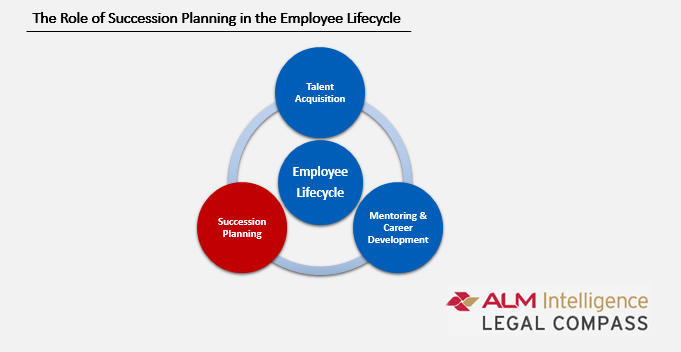Securing the Future: Law Firm Succession Planning and the Challenges of Managing a Multigenerational Workforce
Read the introduction of ALM Intelligence's report on the state of law firm succession planning.
November 15, 2017 at 07:11 AM
4 minute read
Below is the introduction of Securing the Future: Law Firm Succession Planning and the Challenges of Managing a Multigenerational Workforce. The full report is available on the ALM Intelligence website.
Succession planning, the final and arguably most important piece in the employee lifecycle, is integral to the long-term success of any enterprise. Businesses are not immortal; their continued existence, once created, is far from guaranteed. In the current age of innovation and disruption, planning for the future in the present is more critical than ever.
This holds true particularly for the legal sector, an industry where individuals, in the form of equity partners, have outsized impacts on the fortunes of their firms. To ensure their organizations' future, firm leaders must face of a governance structure that traditionally incentivizes short-term profit maximization for individuals at the expense of long-term strategic planning and stability for the firm. Consequently, failure to plan the stewardship of the business and its passing to the next generation puts the future of the firm at great risk.
To complicate matters further, firms are now faced with increasing life spans and greater economic and business volatility. Firms without concrete succession plans in place face a waterfall of issues from an excess of Baby Boomer senior partners and a lack of junior and mid-level attorneys. Further, failure to plan not only causes tension internally in terms of securing firm continuity, but also externally by endangering client relationships and firm reputation.
In direct contrast with how they would advise their clients to approach the issue, many firms adopt a “this will all work itself out” attitude instead of planning strategically and formally. Unprepared and underprepared firms often rationalize their ad-hoc approach with statements such as “succession planning is embedded in firm culture” or “succession planning is something everyone does even though it is not formalized.” Similar to lateral hiring and strategic planning, law firms that are not creating or sticking to formal succession plans, or reviewing them with any frequency, are putting themselves at risk in the long run.
Relying on industry research and interviews as well as ALM Intelligence's proprietary data, this report is divided into four sections. The first reviews the state of law firm succession planning, and the second takes a closer look at the types of firms that struggle most with the issue. The third section places succession planning in its proper, broader context: The foundation for effective succession planning is laid long before a partner reaches retirement; and effective succession planning is the culmination of a comprehensive talent management program that recognizes the importance of hiring, retaining, and mentoring a diverse, multigenerational workforce. Finally, the fourth sections includes a list of best practices and practical strategies firms should employ to better prepare for their future and smooth the transition of their partnership from one generation to the next.
Time does not stand still, and as a result, the challenges presented cannot be avoided. The only question is: Is your firm ready?
Download the full report here.
 Daniella is a Senior Analyst at ALM Legal Intelligence. Her experience includes advising law departments in relation to strategy, technology, market intelligence, and operations. A member of the New York Bar Association, Daniella holds a Juris Doctor degree from The Benjamin N. Cardozo School of Law. She can be reached via email, Twitter, or LinkedIn.
Daniella is a Senior Analyst at ALM Legal Intelligence. Her experience includes advising law departments in relation to strategy, technology, market intelligence, and operations. A member of the New York Bar Association, Daniella holds a Juris Doctor degree from The Benjamin N. Cardozo School of Law. She can be reached via email, Twitter, or LinkedIn. ![]()
This content has been archived. It is available through our partners, LexisNexis® and Bloomberg Law.
To view this content, please continue to their sites.
Not a Lexis Subscriber?
Subscribe Now
Not a Bloomberg Law Subscriber?
Subscribe Now
NOT FOR REPRINT
© 2025 ALM Global, LLC, All Rights Reserved. Request academic re-use from www.copyright.com. All other uses, submit a request to [email protected]. For more information visit Asset & Logo Licensing.
You Might Like
View All
Chinese Firms Hire Partners from Kirkland and Paul Hastings in Hong Kong

Wachtell Partner Leaves to Chair Latham's Liability Management Practice
2 minute read
New Law Firm Broadfield Hires Sidley Trio and Launches in Hong Kong with Local Alliance
Trending Stories
- 1Public Notices/Calendars
- 2Wednesday Newspaper
- 3Decision of the Day: Qui Tam Relators Do Not Plausibly Claim Firm Avoided Tax Obligations Through Visa Applications, Circuit Finds
- 4Judicial Ethics Opinion 24-116
- 5Big Law Firms Sheppard Mullin, Morgan Lewis and Baker Botts Add Partners in Houston
Who Got The Work
J. Brugh Lower of Gibbons has entered an appearance for industrial equipment supplier Devco Corporation in a pending trademark infringement lawsuit. The suit, accusing the defendant of selling knock-off Graco products, was filed Dec. 18 in New Jersey District Court by Rivkin Radler on behalf of Graco Inc. and Graco Minnesota. The case, assigned to U.S. District Judge Zahid N. Quraishi, is 3:24-cv-11294, Graco Inc. et al v. Devco Corporation.
Who Got The Work
Rebecca Maller-Stein and Kent A. Yalowitz of Arnold & Porter Kaye Scholer have entered their appearances for Hanaco Venture Capital and its executives, Lior Prosor and David Frankel, in a pending securities lawsuit. The action, filed on Dec. 24 in New York Southern District Court by Zell, Aron & Co. on behalf of Goldeneye Advisors, accuses the defendants of negligently and fraudulently managing the plaintiff's $1 million investment. The case, assigned to U.S. District Judge Vernon S. Broderick, is 1:24-cv-09918, Goldeneye Advisors, LLC v. Hanaco Venture Capital, Ltd. et al.
Who Got The Work
Attorneys from A&O Shearman has stepped in as defense counsel for Toronto-Dominion Bank and other defendants in a pending securities class action. The suit, filed Dec. 11 in New York Southern District Court by Bleichmar Fonti & Auld, accuses the defendants of concealing the bank's 'pervasive' deficiencies in regards to its compliance with the Bank Secrecy Act and the quality of its anti-money laundering controls. The case, assigned to U.S. District Judge Arun Subramanian, is 1:24-cv-09445, Gonzalez v. The Toronto-Dominion Bank et al.
Who Got The Work
Crown Castle International, a Pennsylvania company providing shared communications infrastructure, has turned to Luke D. Wolf of Gordon Rees Scully Mansukhani to fend off a pending breach-of-contract lawsuit. The court action, filed Nov. 25 in Michigan Eastern District Court by Hooper Hathaway PC on behalf of The Town Residences LLC, accuses Crown Castle of failing to transfer approximately $30,000 in utility payments from T-Mobile in breach of a roof-top lease and assignment agreement. The case, assigned to U.S. District Judge Susan K. Declercq, is 2:24-cv-13131, The Town Residences LLC v. T-Mobile US, Inc. et al.
Who Got The Work
Wilfred P. Coronato and Daniel M. Schwartz of McCarter & English have stepped in as defense counsel to Electrolux Home Products Inc. in a pending product liability lawsuit. The court action, filed Nov. 26 in New York Eastern District Court by Poulos Lopiccolo PC and Nagel Rice LLP on behalf of David Stern, alleges that the defendant's refrigerators’ drawers and shelving repeatedly break and fall apart within months after purchase. The case, assigned to U.S. District Judge Joan M. Azrack, is 2:24-cv-08204, Stern v. Electrolux Home Products, Inc.
Featured Firms
Law Offices of Gary Martin Hays & Associates, P.C.
(470) 294-1674
Law Offices of Mark E. Salomone
(857) 444-6468
Smith & Hassler
(713) 739-1250










